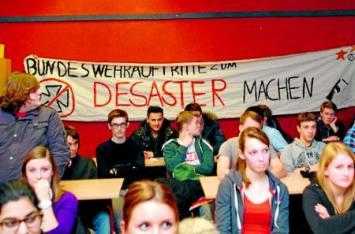Use this for stories related to the militarisation of youth
Friday 14 June 2013 will be an International Day of Action For Military-Free Education and Research.
International war in the 21st century is less about conscription, and more about 'smart' technology and highly trained mobile forces. In the past, war resisters tried to make conscription unworkable – and they sometimes succeeded. Now, War Resisters' International carries on the struggle against preparations for war and against changing forms of militarism throughout the world, because one aspect of war has not changed: it continues to indiscriminately wreak death and destruction.
Militarisation in the UK generally
'Militarisation' means the ways in which the presence and approaches of the military (typically state armed forces and Defence Ministries) are normalised in a society. Military solutions are prioritised, and the military is privileged in various ways.
A society has to be militarised for a government to justify the development and maintenance of nuclear weapons to its citizens; militarisation creates a culture of acceptance. It popularises military euphemisms such as 'Defence', 'Security', and – particularly relevant to nuclear weapons – 'deterrant', and makes it hard to for those challenging these to be seen as credible.
In September 2012 an antimilitarist action week took place in Germany – an evaluation
The idea of the action week arose from a small group during the 'PAXX (Peace) Action Conference' - an open meeting of antimilitarists – in March 2012 in Mannheim, and was originally related to the sector 'Bundeswehr (the German army) in schools'. Because of the high interest and the request of initiatives of the civil clause movement, the topic was shortly afterwards completed with the sector 'Military and armament research in colleges'. All the proposals were taken up and from September 24 to 29 the action week 'Für militärfreie Bildung und Forschung' (For Military-Free Education and Research) took place. The coordination of the action week, i.e. organisation and dispatch of a nationwide leaflet and maintenance of the action webpage was concentrated in the state of Baden-Württemberg and was taken over by the campaign 'Schulfrei für die Bundeswehr Baden-Württemberg' (No school for the Bundeswehr Baden-Württemberg).
Consideration of reports submitted by States parties under article 8, paragraph 1, of the Optional Protocol to the Convention on the Rights of the Child on the involvement of children in armed conflict
Concluding observations: Australia
CRC/C/OPAC/AUS/CO/1
11 July 2012
(...)
Prevention
Direct participation
The international study conference on Countering the Militarisation of Youth, which took place from 8-10 June 2012 in Darmstadt, Germany, was a great success. With the conference we made an important step towards more cooperation and exchange among groups working on militarisation of youth in a range of topical areas and countries. For the conference, we brought together 65 participants from 14 countries and four continents, which in itself has been a great achievement. Our discussions enriched our understanding of militarisation, and helped to inspire us how to resist this militarisation.
The issue of child soldiers is back on the global agenda, thanks to two major recent developments. In March, Thomas Lubanga became the first person to be convicted by the International Criminal Court. He was found guilty of forcibly recruiting child soldiers to his Union of Congolese Patriots, known as 'the army of children'. The second, most visible development, was the massive popularity growth of web-based film KONY2012.
In this article we will explain how we understand in what ways politics about gender, sexuality and war are related to each other. We will also tell you about some actions Ofog (anti-militarist network) did against the Swedish Armed Forces participation in the last Pride festival (August 2011).
The US military maintains an Orwellian database containing intimate details on 30 million youth between the ages of 16 and 25, providing local recruiters with personal information to use in a psychological campaign to lure youth within their designated regions. Before meeting, recruiters know what's in Johnny's head, if Johnny has a girlfriend, and what she thinks of his decision regarding enlistment. We'll examine how they do it.
The debate about the “militarisation of research and teaching” is relatively new in Germany, and happens against the background of the restructuring of the German Bundeswehr from an alleged “defence army” to an “army in deployment”. This restructuring and the extent to which it affects the entire German population, are usually underestimated. While the defence army was, by design, relatively evenly distributed over Germany’s territory, at present, several military bases are being closed or merged, and military capabilities are concentrated at some locations.
The UK armed forces visit thousands of schools each year. They offer school presentation teams, ‘careers advisors’, lessons plans, away days and more.



